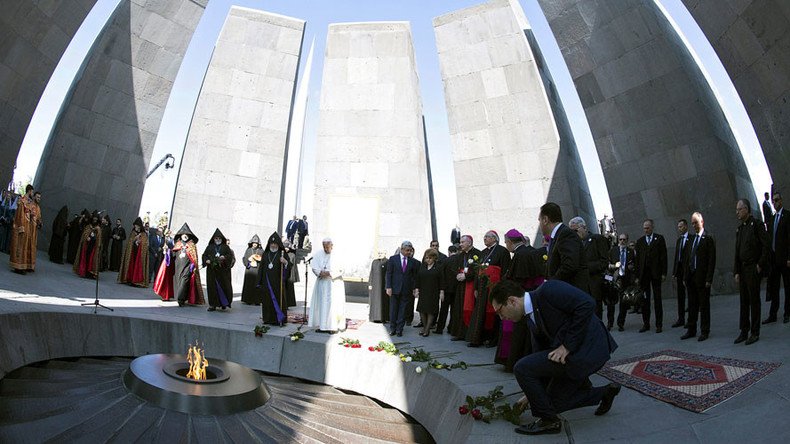‘Sherlock Holmes of Armenian Genocide’ claims new evidence definitively ends case for denial

Turkey has failed to recognize the Armenian Genocide, which began in 1915 as World War I raged across Europe, for over a century but now new evidence has come to light which may prove beyond doubt the slaughter took place.
Taner Akcam, a Turkish historian at Clark University in Massachusetts claims to have uncovered and deciphered an original Ottoman government telegram from 1915 which, he argues, proves state complicity in the genocide.
“Until recently, the smoking gun was missing,” Akcam said, as cited by The New York Times. “This is the smoking gun.”
The systematic killing of up to 1.5 million Armenians by the Ottoman Empire which is widely, but not completely, recognized as the first genocide of the 20th century, has long been denied by successive Turkish governments for over a century.
The denial centers around the absence or disappearance of military tribunal documents from the post-war period which showed the convictions of generals involved in the act.
Akcam has described his recent discovery as “an earthquake” that he hopes will finally remove “the last brick in the denialist wall.”
French parliament votes to criminalize denial of Armenian genocide, offenders face year in jail https://t.co/jCgKHeyH3W
— RT (@RT_com) July 2, 2016
Ackam found an original, but encrypted, telegram that was sent in 1915 from the Turkish city of Erzurum. A high-ranking official of the Ottoman Empire, Behaeddin Shakir, sent a coded telegram to a colleague in the field requesting details on the deportations and en-masse exterminations of Armenians in the eastern Anatolia region.
A deciphered copy of the telegram helped convict Shakir in absentia, but the original court documents, replete with sworn testimony, later disappeared under dubious circumstances.
Those who researched the genocide have since relied on secondary sources, such as the official Ottoman state newspaper, to build the case that definitively proves the genocide took place.
“My firm belief as a Turk is that democracy and human rights in Turkey can only be established by facing history and acknowledging historic wrongdoings,” said Ackam.
Merkel dismisses Erdogan’s ‘incomprehensible’ criticism of #ArmenianGenocide resolution https://t.co/zmyDc0WZzXpic.twitter.com/tq4Hbzkgty
— RT (@RT_com) June 8, 2016
Akcam’s academic career has been devoted to exposing what remains a raw nerve for many in Turkey. Yet he recognizes that given present circumstances in his home country, following a referendum which affords President Recep Erdogan unprecedented powers, his discovery is unlikely to create any shift in the official line.
He further argues that many of the ills of the modern Middle East stem from the widespread refusal of various peoples in the region to take ownership of their historic transgressions against one another.
“The past is not the past in the Middle East,” he said. “This is the biggest obstacle to peace and stability in the Middle East.”
Eric D. Weitz, a history professor at the City College of New York has dubbed Ackam ‘the Sherlock Holmes of the Armenian Genocide’ for his sterling and tenacious investigative work into what remains a bitter and painful chapter in the history of Turco-Armenian relations.
April 24 is recognized as the day in 1915 when the genocide began and is commemorated by Armenians worldwide each year.
In 2016, Pope Francis referred to the killings as a genocide and faced massive backlash from Turkey, as has been the case in every instance of recognition by a state, official body or public figure.
BREAKING: Pope Francis describes mass killing of Armenians in Turkey as 'genocide' https://t.co/NpSjDmAMvQpic.twitter.com/CDnGp8A5IF
— RT (@RT_com) June 24, 2016
Germany, France, Italy, Russia, Canada, The Vatican and Argentina are among the countries that have officially recognized the events in Anatolia in 1915 as an act of genocide.
Germany says Armenia genocide resolution ‘non-binding’ after reports Berlin keen to ‘satisfy’ Turkey https://t.co/6nCnkRXFkY
— RT (@RT_com) September 3, 2016












